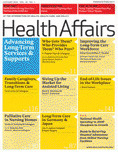Health Care Spending Growth Slower
by
Astrid Fiano, DOTmed News Writer | January 14, 2010

An important health
spending update
The journal Health Affairs has an article in the January 2010 issue by the Centers for Medicare and Medicaid Services (CMS) Office of the Actuary and the National Health Expenditure Accounts Team on health care spending in the U.S.
The article, "Health Spending Growth at a Historic Low in 2008" examines how U.S. health care spending growth in 2008 slowed to 4.4 percent, to $2.3 trillion or $7,681 per person. The authors say this has been the slowest rate of growth over the past 48 years.
According to the authors' research, the 2008 figure is down from 6.0 percent growth in 2007. Spending slowed for most health care goods and services, and sources of government and private funds slowed significantly. Personal health care spending also grew just 4.6 percent in 2008. By comparison, federal health spending increased to a 35 percent growth rate.
Health Outpaced GDP
However, health care spending did outpace nominal Gross Domestic Product (GDP) growth overall, which grew only by 2.6 percent in 2008, and real GDP growth of only 0.4 percent. Health care spending as a share of the nation's GDP continued to climb, reaching 16.2 percent in 2008, up 0.3 percentage points from 2007. The article notes that the U.S. economy was in a recession in 2008, and health care spending in the GDP tends to rise during or after a recession.
The report states that these findings indicate "relatively severe recessions may have more immediate and profound impacts on health care spending growth." As example, personal health care paid by private sources increased only 2.8 percent as personal income growth slowed, employment rates fell, and enrollment in private health insurance plans declined; and private health insurance benefit spending slowed to 3.9 percent, the slowest rate since 1967. Enrollment in private health insurance declined from 196.4 million in 2007 to 195.4 million in 2008.
"This report contains some welcome news and yet another warning sign," said Jonathan Blum, director of CMS' Center for Medicare Management, in a CMS press release. "Health care spending as a percentage of GDP is rising at an unsustainable rate. It is clear that we need health insurance reform now."
The American Recovery and Reinvestment Act of 2009 (ARRA) also impacted health spending. The ARRA provided a temporary 27-month increase in Federal Medical Assistance Percentages used to determine the federal Medicaid payments to states. The ARRA enabled approximately $7 billion in Medicaid spending to shift from states to the federal government for the last quarter of 2008. This caused federal share of total Medicaid spending to rise to 58.5 percent in 2008, compared to 56.5 percent in 2007.
Other health care spending figures in the report include:
-- Hospital spending in 2008 grew 4.5 percent to $718.4 billion, compared to 5.9 percent in 2007.
-- Physician and clinical services spending increased 5.0 percent in 2008, a deceleration from 5.8 percent in 2007.
-- Spending growth for both nursing home and home health services decelerated in 2008; nursing home spending grew 4.6 percent in 2008 compared to 5.8 percent in 2007.
-- Private health insurance premiums grew 3.1 percent in 2008, a deceleration from 4.4 percent in 2007.
Adapted in part from a CMS press release.
Read all the details:
The CMS release: http://www.cms.hhs.gov/apps/media/press/release.asp?Counter=3570&intNumPerPage=10&checkDate=&checkKey=&srchType=1&numDays=3500&srchOpt=0&srchData=&keywordType=All&chkNewsType=1%2C+2%2C+3%2C+4%2C+5&intPage=&showAll=&pYear=&year=&desc=&cboOrder=date
The article may be accessed at: http://content.healthaffairs.org/cgi/reprint/29/1/147
